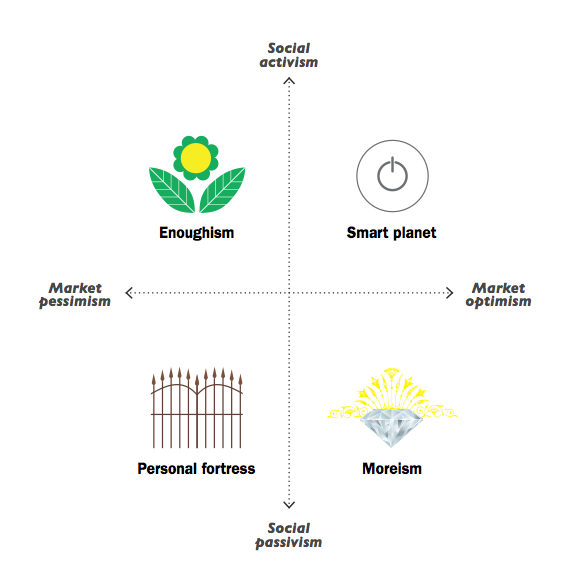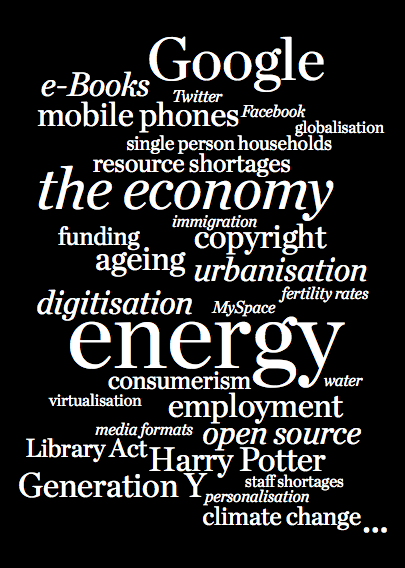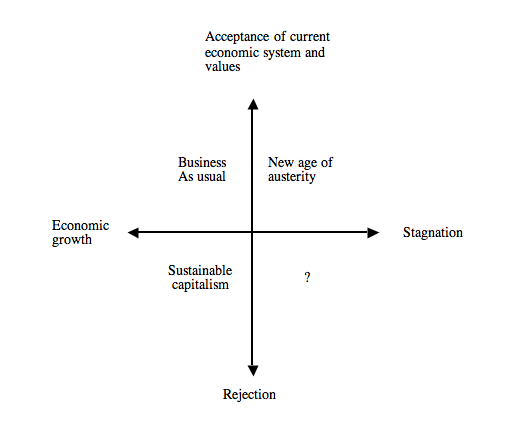Scenario 1 Draft
This is a world of distant thunder, where people have become alarmed about the health of the planet, especially the destructive effects of global growth and rampant consumerism. Following a series of highly destructive weather events, financial catastrophes and pandemics, people turn against the globalists, the techno-futurists and the multi-nationalists to look for simpler and more sustainable solutions closer to home. This is a world of strong family ties where people trust each other. It is also a world where people are drawn to things that don’t change, where free public spaces that are open to old and young alike are valued and protected.
Hence the idea of local living gains momentum, which, ironically, becomes a global movement. The leaders of the campaign then merge their ideas with those of a number of other likeminded movements, including the Slow Cities movement and the Fair Trade Alliance, and the Commonsense Revolution is born.
This is a sustainable world of switching things off, living on less and doing without certain things. It is intensely local, fiercely authentic, more emotional, less rational, more reflective and multi-sensorial. Climate change and resource shortages mean that energy efficiency is a key priority and local governments fund small grassroots campaigns to persuade people to generate their own power and recycle their own water. Grants also encourage people to grown their own food and large areas of publicly owned land are given over to city-farms and village growing co-operatives.
Alternative energy is key feature of this world, although most of the solutions remain fairly low-tech. Power generation shifts to local networks to avoid losses due to transmission and most homes, offices and public buildings generate at least some of the power they require through a mixture of solar and wind power.
Use of fossil fuels is significant for many decades (especially in transportation and manufacturing) but the mixture of high prices and green taxation means that the days of oil, coal and gas are numbered.However, at a domestic level change takes hold far sooner. The use of electrical goods declines and there is a slow but significant drift back towards analogue and human-powered technologies due to reliability and cost considerations. Hence, $2,000 tumble dryers are thrown out and recycled in favour of $20 washing lines. Cars are replaced with scooters and bicycles, people make and mend their own clothes and children start walking to school again.
Use of the internet, social networks and virtual worlds also decline, partly due to cost. This doesn’t mean that all technology is rejected, simply that people think carefully about what they need and try to achieve some level of balance by weighing up the personal against the collective disadvantages. Technology is balanced against overall human needs.
The only exception to the widespread rejection of electronics is the mobile phone. The use of mobiles increases for a number of years but eventually starts to fall off following a number of research studies linking mobile phone use to EMF radiation and cancer. Local governments then start to ban the use of mobiles in government building such as schools, hospitals and libraries.
To begin with this provokes a number of protests, especially from young users, who organise flash-mob protests, but eventually people accept the ruling and divert their calls to landline telephones instead. This co-incidentally proves to be an extremely good idea because landlines turn out to be far more resilient against power blackouts and phone viruses.
Work, too, is localised. There are still people that travel vast distances to work by public transport and there are those that travel the world in search of meaningful employment or escape. But by and large people shift their employment needs and leisure diversions to things that are more local. Work-life balance remains a key part of this equation, with many people giving up a proportion of their income in return for less travel or less stress. This means there is a gradual drift away from the big cities towards smaller towns and villages although some people, especially singles, are still attracted to major urban areas, which are now more ordered and calmer than they were in 2009.
In terms of information, things start to change here too. The production of new information declines substantially due to the slow shift away of the internet and digital devices. There is also a noticeable shift by consumers of information towards quality sources. In most instances trusted sources are fairly local, although a handful of well-established global infotainment brands and academic information publishers
do extremely well.
The movement towards safe sources also benefits physical books. e-Books are widely rejected due to concerns about sustainability but also because there is a feeling that digital devices like these benefit nobody over the longer-term. For example, a series of scientific studies demonstrates that the repeated use of mobile devices during the early part of the 21st century led to a decline in empathy due to a focus on the self and also a reduction in overall intelligence due to a lack of contextual understanding. People also believe that e-books accelerate the outsourcing of the human mind and user underestimate the literal and figurative sense of weight that is part of the analogue reading experience.
Physical books (including old and second-hand books) therefore make a rather unexpected re-appearance and physical libraries do well too because they are perceived as important pillars of the local community where people can physically interact and converse. Thus, libraries are transformed into local information centres, dispensing vital community information and also providing a physical refuge where disadvantaged groups can seek protection as well as knowledge.
Government funding for libraries remains low in this world, partly because economic growth is now restrained but also because environmental security and the health of the ageing population remain higher priorities. A new Libraries Act also signals a shift towards the introduction of more user-pays services and an end to what some library users consider ‘restrictive’ practices. Staffing is therefore tight but libraries cope with surging user demand by recruiting multi-skilled personnel and also by enticing retired knowledge workers to work part-time.
It is not all good news though. Libraries struggle to maintain old buildings, which are regularly attacked by the wild weather and there is also pressure from local government to make the buildings as green as possible and to add as many government services as physically possible.
Draft Timeline — Scenario #1
2010
Library visits up 4.25% over previous year and 17.49% over past 5 years
New strain of H5N1 influenza emerges and kills 250,000 in China alone
The Murray River records lowest ever flow of 88 gigalitres in January 2010
Collapse of Macquarie Bank sparks dancing protests again globalisation
Study finds that attention spans have declined to 2-minutes for teens.
Local newspapers resist widespread shift to e-news
Report claims that the average avatar uses more energy than the average German
Online banking accounts tumble in favour of local branches
The local living movement starts in Parkes and spreads throughout NSW
Library visits up 12% on 2009
2011
Launch of Local Living magazine. First print run is 100,000 copies
American Express (aka American Excess) loses major class action in US
Biofuel production blamed for death of 150,000 children in India
Australia records driest year on record
Local Living circulation now at 200,000 copies per month
Widespread flooding in USA
Commonwealth Bank opens series of branches inside libraries
Climate change and work-life balance key issues in Australian federal election
Slow Cities movement signs up councils across Europe — traffic banned at weekends
Sony successfully sued in France for peddling addictive video games
2012
Felix Denis buys Local Living magazine. US edition sells 950,000 in first month
CSIRO unveils nano ‘wallpaper’ for use on roofs and sides of houses
Water restrictions re-introduced and made permanent in most Australian cities
New-build swimming pools banned whilst existing pools attract pool tax
Google zeitgeist announces that ‘sustainability’ was 8th most popular search in 2011
Washing machine sales tumble by 50% year on year
Amazon withdraws Kindle 3 from sale in Australia
Global boycott of plastic packaging extends to plastics used in technology devices
Robotic pets the biggest flop of Christmas 2012
Bob Dylan’s Shelter from the Storm is re-released on vinyl and sells 900,000 copies
2013
People start to fill in swimming pools to grow vegetables
Launch of the ‘Analogue Coalition’ to protect physical books and letter writing
Study by the Australia Institute claims that 45% of households have downshifted
Article in newspaper claims that second-hand bookshops opening at rate of ten a week
Survival store opens next door to the Apple store in George Street, Sydney
IAG refuse to insure any real estate situated within 5km of the coast
Boom in sale of domestic security products
Dick Smith launches Battler’s Bank
European Union collapses in face of rising nationalist sentiment
Oil now at $160 a barrel and rising
Boycott of plastic toys knocks 30% of Hasbro’s share price in US
2014
McDonald’s announce that their menu is now 100% local and organic
Car sales down 20% with the exception of city runabouts
Apple stores burnt down. Slogans on pavements outside include people not machines
Major shift towards home-based leisure announced by Mintel Research
85% of adults in Australia claim they would like to be a civil servant
Number of robots in domestic service worldwide drops from 4 million to 657,000
30% of children now either walk or cycle to schools (up from 9% in 2007)
Chinese economy turns inwards after GDP growth slips to 4%
Wikipedia starts to publish physical encyclopaedias
2015
Local governments announce library grants for citizen-preservation of local history
Sales of Dutch bicycles increase four fold in six-months
Government announces that the weight of the average child has fallen by 5%
Reports says that walking speeds in major cities have fallen by 5% in 5 years
95% of ocean fish now below sustainable levels
76% of young adults now a member of at least one single issue action group
Volume of traffic on UK roads drops by 30%
PEW report claims that 76% of Americans have nil or negative net worth
Insurance on property now represents 25% of global GDP
2016
Study shows link between mobile phone use and childhood leukaemia
Local governments ban use of mobile phones in schools and hospitals
Ban extended to all government building including libraries
Teens gather outside schools to protest against phone bans
Police able to fine parents that place TVs or computers in children’s rooms
Penn State University says average person has 50 hours of free time per week
33% of Chinese patent applications are to do with bicycles or e-scooters
2017
Second study finds definitive link between mobile phones and brain cancer
Mobile phone sales fall by 800% in six months
Local governments announce grants to ‘green’ old library buildings
6 out of 10 of the fastest growing companies in the US are environment related
Newspaper says that office productivity has increased 25% since death of Twitter
25% of Silicon Valley start-ups now clean tech related
Chinese economy collapses following major banking scandal
Google abandons book digitalisation project citing copyright issues
2018
BBC media buys the Australian physical newspaper assets of News Corporation
US v Google anti-trust case results in break-up and sale of library assets
Book sales now exceed lottery ticket sales worldwide
Average life expectancy in Asia now 65 and falling
Invention of paper announced as ‘world’s greatest’
Deceleration named as the #1 trend of 2018 by What’s Next report
Study finds that investment in technology has no noticeable impact on intelligence
2019
Oil hits $200 a barrel
Fresh water now largely priced by time of use x litres
Survivalism for Dummies is the runaway publishing hit of 2019
List of best professions includes; green architects, teachers, booksellers and librarians
40% of bank loans now used to improve the energy efficiency of real estate
Local government places restrictions on the use of technology in classrooms
Russia turns off gas pipeline to Europe citing resource security issues
2020
NPR report says that library use has quadrupled over the past 20 years
YouGov report says that stress costs the UK economy £66 billion per year
Readers Digest named as most trusted media brand alongside BBC and ABC
Series of scandals relating to accuracy of information used by Fox News
2021
Libraries introduce free health screening for over 55s
Rising sea levels cause mass population movements globally
77% of people say that they expect everything to be lots worse next year
‘Library on a bike’ a major hit across Asia
Local government allocates funds for development of mobile library network
Libraries experience surging demand for survivalist books and especially talks
2022
Reports says that more people know their neighbours names that 25 years ago
Sales of fountain pens up 80% in Japan
ABC childcare in second collapse as parents shift towards home-based work
Best selling book of 2022 is Books and Other Things that are Supposed to be Dead
Libraries sell board games
2023
Report says that average number of real friends has risen from 4 to 9 in 10 years
Libraries attract funding for series of events on Slow Living
Sales of garden equipment up 400% since 2019
Evening chess nights a surprise hit in local libraries
2024
Oxford University study claims that obesity epidemic is officially over
Global demand for flood engineers outstrips supply by 500:1
High winds kill 2010 overnight in Melbourne
Woolworth’s announces launch of farmer’s markets in all its car parks from Feb 2025
2025
Libraries offer free language services for recently arrived migrants
Extended Financial Families become the dominant household type in Australia
Laptop computers banned in public libraries
Report by Library Council of NSW says that paper is most durable media format
2026
Imported bottled water now banned although some supplies manage to drip through
Libraries become pivotal in tackling social exclusion
Libraries create events to build community identity and develop citizenship
Best selling book of 2026 is Books and other Things that are Supposed to be Dead
2027
Reports claims that Australia has lost 5% of its coastline due to erosion.
Increase in demand for wind-up products, especially radios and torches
2028
Book by James Lovelock Jnr claims that 98% of human race will be extinct by 2100
78% of people say they wish James Lovelock jnr would become extinct by 2029
New local tax on non-renewable energy consumption
2029
White candle sales catch fire and grow 800% in a single year
Local search trend intensifies
Collection strategies switch from vocational learning to local history and environment
2030
Librarians named as ‘living national treasures’ by Local Living magazine
Report says that global happiness index is at highest level since 1945
Philanthropists divert funds to public libraries







